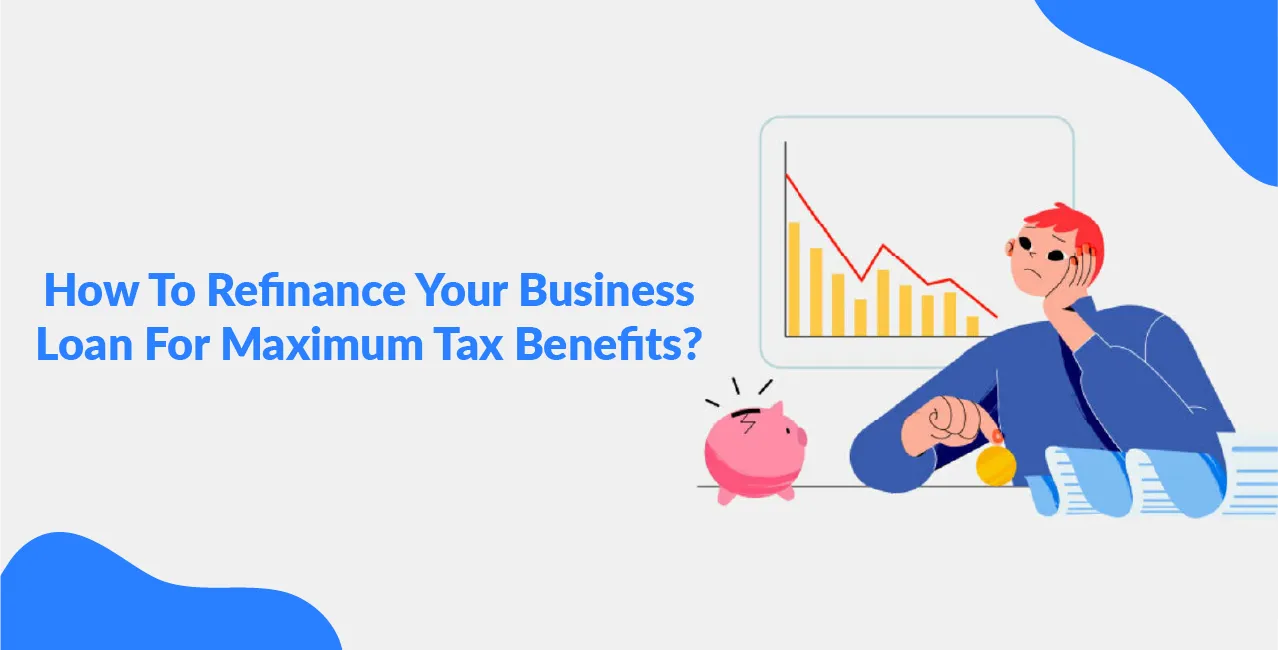How To Refinance Your Business Loan For Maximum Tax Benefits?

Check Your Loan Eligibility Now
By continuing, you agree to LoansJagat's Credit Report Terms of Use, Terms and Conditions, Privacy Policy, and authorize contact via Call, SMS, Email, or WhatsApp
Sakshi runs a printing company. She had taken a ₹35 lakh loan at 17% annual interest. After 18 months, the business still owed ₹24 lakh. Sakshi decided to refinance this with another lender. Another lender provided her an interest rate of 11.5% annually.
She was able to reduce the company’s monthly outgo by ₹8,200. More importantly, she was able to save over ₹2.75 lakh yearly in interest. It was deducted as a business expense. Hence, reducing the taxable profit.
Many business owners, like Sakshi, rely on loans to fund their business needs. But as time passes, the original terms of the business loan may no longer suit your needs. That’s when refinancing becomes an option worth exploring.
What Does Refinancing A Business Loan Mean?
It means you take a new loan to repay your existing loan. This may be done to:
- Secure a lower interest rate
- Change the repayment period
- Consolidate multiple loans
- Convert from an unsecured to a secured loan
Usually, you do it to reduce costs or improve cash flow. But it also opens up opportunities for you to manage taxes better.
Read More - New Tax Regime Exemption List
What Can Be Claimed For Tax Benefits?
When you refinance your business loan, your new interest payments and related expenses are still eligible for tax deductions. But you must use funds strictly for business operations only.
1. Interest Payment
If you are paying interest on a business loan, even a refinanced one, it qualifies as a business expense.
- You can claim it as a deduction from business income under Section 36(1)(iii) of the Income Tax Act.
- There is no upper limit for deduction.
Example:
Loan Amount | Interest Rate | Annual Interest | Deductible Under Income Tax |
₹30,00,000 | 14% | ₹4,20,000 | Yes |
After Refinancing | 10.5% | ₹3,15,000 | Yes |
Difference | - | ₹1,05,000 | Also Deductible |
Even your reduced interest is also fully eligible for deduction.
2. Other Charges During Refinancing
When you refinance your loan there are additional charges like:
- Prepayment or foreclosure charges
- Processing fees
- Valuation and legal fees
Read More – Your Personal Loan for Better Savings
These are also deductible in the year they are incurred. You can show these as operating expenses in your profit and loss account.
Example:
Expense Type | Cost (₹) | Can You Claim It? |
Prepayment Charges | 25,000 | Yes |
Processing Fee (New Loan) | 18,000 | Yes |
Valuation & Legal Fee | 7,500 | Yes |
Total | 50,500 | Yes |
When Is The Right Time To Refinance?
- The interest rate difference is significant (at least 2%).
- Your repayment track record is good.
- There are at least 1 to 1.5 years left in the terms of your loan.
- You want to free up your working capital for business use.
Example:
Current Rate | New Rate | EMI Saving | Refinance? |
16% | 11% | ₹7,500+ | Yes |
14% | 12.5% | ₹3,000 | Worth Checking |
12% | 11.5% | ₹900 | Not Ideal |
Tips To Maximise Tax Advantage While Refinancing
Also Read - Mutual Fund Tax Exemption
1. Use the funds strictly for business
You should avoid mixing personal and business use as it may disqualify the deductions.
2. Maintain documents
Keep the following documents ready:
- Loan agreement
- Payment proof
- Expense receipts
These are necessary during your income tax assessments.
3. Account for charges correctly
You should include all one-time fees under business expenses in the correct financial year.
4. TDS on interest (if applicable)
If you are dealing with NBFCs or private lenders then remember to deduct TDS on interest payments to avoid disallowance.
Also Read - Top 3 Strategies to Pay Off Business Loans
Potential Savings Over Time
Umesh has a business loan of ₹20 lakh. He refinanced it from 16% to 11% for a term of 3 years.
Particulars | Amount (₹) |
Interest (Old Rate) | ₹3,20,000 per year |
Interest (New Rate) | ₹2,20,000 per year |
Annual Savings | ₹1,00,000 |
3-Year Savings | ₹3,00,000 |
Tax Benefit (25%) | ₹75,000 |
You can see that by simply switching to a lower-cost loan, Umesh saved ₹75,000 in taxes over three years.
Important Points To Avoid Mistakes
- Don’t extend your loan term only to lower the EMI as it will increase the total interest cost.
- Avoid paying too much in processing or legal charges.
- Refinancing too often can hurt your creditworthiness.
Final Thoughts
If you are planning to refinance your business loan then you must know that it can go beyond just saving interest. If you use it wisely, it can become a strong strategic tool to:
- Lower your taxable income
- Enhance your cash flow
With interest and related charges fully deductible, and a lower EMI improving your working capital, refinancing can offer both immediate and long-term benefits.
You should always maintain financial clarity. If you are not sure about how to account for refinancing-related costs then you must consult a tax expert.
FAQs
1. Do I need CA help to claim these deductions?
It’s advisable to avoid errors in accounting and compliance.
2. Will frequent refinancing affect my credit score?
Yes, it may impact your profile negatively.
3. Can startups also refinance loans?
Yes, if their credit profile meets lender conditions.
4. Can I claim a deduction on principal repayment?
No, only the interest and fees are allowed.
Other Related Pages | |||
About the author

LoansJagat Team
Contributor‘Simplify Finance for Everyone.’ This is the common goal of our team, as we try to explain any topic with relatable examples. From personal to business finance, managing EMIs to becoming debt-free, we do extensive research on each and every parameter, so you don’t have to. Scroll up and have a look at what 15+ years of experience in the BFSI sector looks like.
Subscribe Now
Related Blog Post
Recent Blogs
All Topics
Contents
Quick Apply Loan
Consolidate your debts into one easy EMI.
Takes less than 2 minutes. No paperwork.
10 Lakhs+
Trusted Customers
2000 Cr+
Loans Disbursed
4.7/5
Google Reviews
20+
Banks & NBFCs Offers
Other services mentioned in this article








